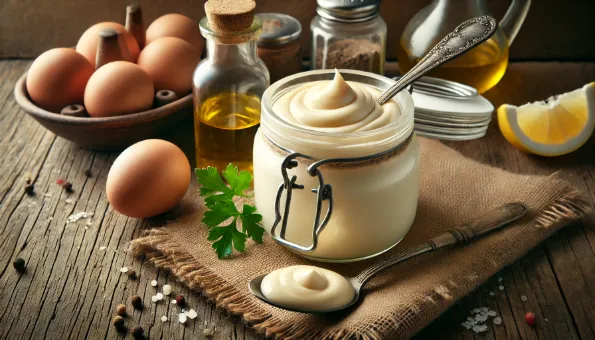Mayonnaise: Creamy Emulsion of Egg, Oil & Tangy Acidity
With 10 g fat per tablespoon, mayo adds velvety texture, vitamin E and monounsaturated fats—but it’s calorie‑dense and must be stored cold.

What Is Mayonnaise?
Mayonnaise is a cold emulsion made by slowly whisking oil into egg yolk with acid (vinegar or lemon) and mustard as an emulsifier. The result is a thick, spreadable sauce foundational to **aioli, tartar sauce and ranch dressing**.
Nutrition (per Tbsp = 14 g)
| | Amount | %DV |
|---|---|---|
| Calories | 94 kcal | — |
| **Total Fat** | 10 g | 13 % |
| – Sat Fat | 1.5 g | 8 % |
| – Mono‑unsat | 6 g | — |
| – Omega‑3 (ALA) | 0.5 g | — |
| Cholesterol | 5 mg | 2 % |
| Sodium | 90 mg | 4 % |
| **Vitamin E** | 1.8 mg | 12 % |
| **Vitamin K** | 22 µg | 18 % |
Potential Benefits
- **Monounsaturated & omega‑3 fats** (if canola/avocado oil) support heart health.
- Egg‑yolk **choline** assists brain & liver function.
- Vitamin E and K act as antioxidants and aid blood‑clotting.
- High‑fat matrix enhances absorption of fat‑soluble vitamins in salads.
Drawbacks & Precautions
- **Energy‑dense**—one generous tablespoon adds ≈ 100 kcal.
- Commercial mayo can be high in **omega‑6–heavy soybean oil**; look for avocado‑ or olive‑oil‑based jars.
- Homemade versions contain raw egg → salmonella risk; use pasteurised yolks.
- Not vegan; “veganaise” swaps egg for aquafaba—check label if avoiding eggs.
Culinary Uses & Tips
- Spread on sandwiches & burgers for moisture barrier.
- Base for **coleslaw**, **potato salad** and devilled‑egg filling.
- Whisk with sriracha or chipotle for instant spicy dip.
- Fold 1 Tbsp into chocolate‑cake batter for extra moisture (fat+lecithin).
Lighter / Alternative Options
- **Greek yogurt** (adds protein, tang, ≈ 60 % fewer calories).
- **Mashed avocado** for plant fat & fiber.
- **Hummus** for extra protein + chickpea fiber.
Storage & Safety
- Store unopened jars at ≤ 20 °C; refrigerate after opening.
- Use commercial mayo within **2 months** once opened; homemade within **4 days** at ≤ 4 °C.
- Discard if oil separates extensively or smell turns acidic.
Sustainability Notes
Conventional mayo relies on **soybean or canola** oils linked to monoculture and deforestation. Choosing non‑GMO, regenerative or **avocado‑oil** mayo supports diversified agriculture. Opt for cage‑free or pasture‑raised eggs in homemade recipes.
Key Takeaways
✔︎ Velvety mouthfeel & vitamin E
✔︎ Calorie‑dense—portion = 1 Tbsp
✔︎ Keep refrigerated; use pasteurised eggs if DIY.
- 1. Mayonnaise
Mayonnaise

